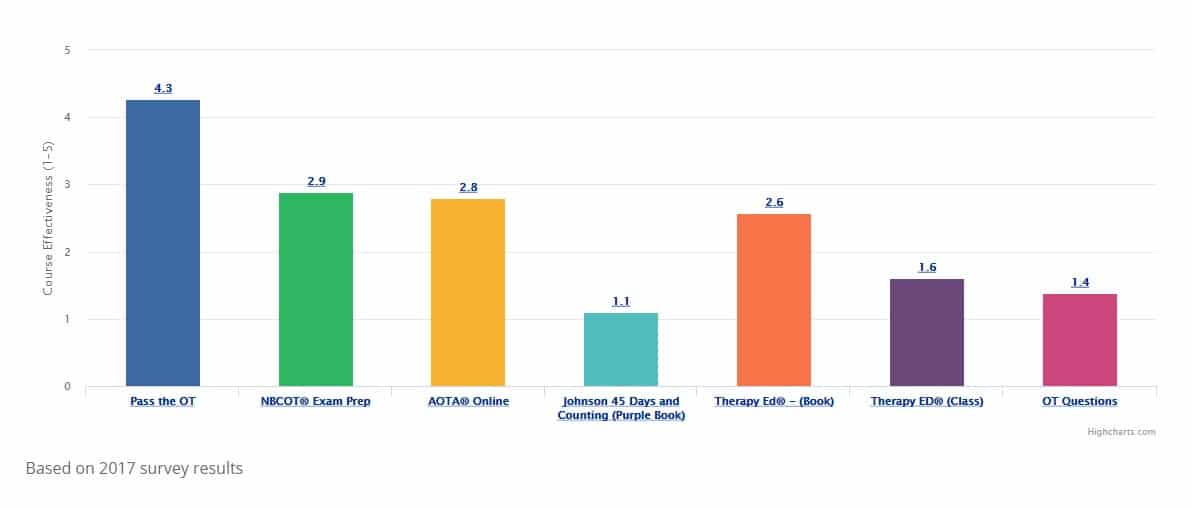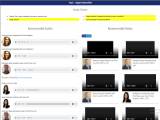5-Days Free Trial
Get everything you need to pass the NBCOT® Exam
Structured and flexible course that simplifies studying and benefits every type of learner.
OTA Exam Prep Program

Choose your package
Program access only:
Access: 45 days
Access: 90 days
Access: 1 Year
Program access + Private tutoring package:
Access: 60 days
Private tutoring: 1
Access: 120 days
Private tutoring: 4
Access: 225 days
Private tutoring: 7
$99 | Crash Course 45-days Access
Save $38 from weekly
- Recommended for: First time test takers who are taking test in less than 30 days
- Group tutoring: 4 group tutoring sessions
Be fully prepared when you study using our real up-to-date material and test questions in our self paced study program that allows you to study what you want, when you want, from whereever you are. Our course includes 2,900 timed/untimed questions , 50 hours of audios/videos, 114 easy to understand charts, weekly group tutoring sessions, private tutoring, and many exclusives you won't find anywhere else.
Our program includes:
Study Material - 8 structured modules consisting of:
- 2900 + timed/untimed questions with rationale
- 114 highlighted charts with audio playback
- 60 hours of streamable audio/video
- Customized study Schedule
- 200 question/100 question Assessment Tests
- Comprehensive Final Exams
- Main Quizzes (on all the topics & domains)
Tutoring Material
- Access to out live weekly group call
- Access to 134 prerecorded group calls in our group calls archives
- Optional private tutoring sessions may be purchased at a discounted price.
Bonus Material
- 24 hr access to support team
- Clinical Scenarios new format (OT Program)
- 6 Question format (OTA Program only)
- Proprietary study tips & Games
- Accommodation Quizzes
- Ability to print out much of our study material
- PTOT mobile app
$169 | First Time 90-days Access
Save $70 from weekly
- Recommended for: First time test takers
- Group tutoring: 16 group tutoring sessions
Be fully prepared when you study using our real up-to-date material and test questions in our self paced study program that allows you to study what you want, when you want, from whereever you are. Our course includes 2,900 timed/untimed questions , 50 hours of audios/videos, 114 easy to understand charts, weekly group tutoring sessions, private tutoring, and many exclusives you won't find anywhere else.
Our program includes:
Study Material - 8 structured modules consisting of:
- 2900 + timed/untimed questions with rationale
- 114 highlighted charts with audio playback
- 60 hours of streamable audio/video
- Customized study Schedule
- 200 question/100 question Assessment Tests
- Comprehensive Final Exams
- Main Quizzes (on all the topics & domains)
Tutoring Material
- Access to out live weekly group call
- Access to 134 prerecorded group calls in our group calls archives
- Optional private tutoring sessions may be purchased at a discounted price.
Bonus Material
- 24 hr access to support team
- Clinical Scenarios new format (OT Program)
- 6 Question format (OTA Program only)
- Proprietary study tips & Games
- Accommodation Quizzes
- Ability to print out much of our study material
- PTOT mobile app
$209 | Bronze 60-days Access + 1 Private tutoring
Savings $59 from weekly with private tutoring
- Recommended for: First time test takers who need extra support or who have scored 440 and above
- Group tutoring: 8 group tutoring sessions
Be fully prepared when you study using our real up-to-date material and test questions in our self paced study program that allows you to study what you want, when you want, from whereever you are. Our course includes 2,900 timed/untimed questions , 50 hours of audios/videos, 114 easy to understand charts, weekly group tutoring sessions, private tutoring, and many exclusives you won't find anywhere else.
Our program includes:
Study Material - 8 structured modules consisting of:
- 2900 + timed/untimed questions with rationale
- 114 highlighted charts with audio playback
- 60 hours of streamable audio/video
- Customized study Schedule
- 200 question/100 question Assessment Tests
- Comprehensive Final Exams
- Main Quizzes (on all the topics & domains)
Tutoring Material
- Access to out live weekly group call
- Access to 134 prerecorded group calls in our group calls archives
- Optional private tutoring sessions may be purchased at a discounted price.
Bonus Material
- 24 hr access to support team
- Clinical Scenarios new format (OT Program)
- 6 Question format (OTA Program only)
- Proprietary study tips & Games
- Accommodation Quizzes
- Ability to print out much of our study material
- PTOT mobile app
$379 | Silver 120-days Access + 4 Private tutoring
Savings $132 from weekly with private tutoring
- Recommended for: First time test takers who want to crush the exam or who have scored 430 and below or who have failed more than once.
- Group tutoring: 16 group tutoring sessions
Be fully prepared when you study using our real up-to-date material and test questions in our self paced study program that allows you to study what you want, when you want, from whereever you are. Our course includes 2,900 timed/untimed questions , 50 hours of audios/videos, 114 easy to understand charts, weekly group tutoring sessions, private tutoring, and many exclusives you won't find anywhere else.
Our program includes:
Study Material - 8 structured modules consisting of:
- 2900 + timed/untimed questions with rationale
- 114 highlighted charts with audio playback
- 60 hours of streamable audio/video
- Customized study Schedule
- 200 question/100 question Assessment Tests
- Comprehensive Final Exams
- Main Quizzes (on all the topics & domains)
Tutoring Material
- Access to out live weekly group call
- Access to 134 prerecorded group calls in our group calls archives
- Optional private tutoring sessions may be purchased at a discounted price.
Bonus Material
- 24 hr access to support team
- Clinical Scenarios new format (OT Program)
- 6 Question format (OTA Program only)
- Proprietary study tips & Games
- Accommodation Quizzes
- Ability to print out much of our study material
- PTOT mobile app
$529 | Gold 225-days Access + 7 Private tutoring
Savings $106 from weekly with private tutoring
- Recommended for:Test takers who have either failed more than twice, scored below 420, graduated over a year ago, or first time test takers who want to give themselves the absolute best chance at passing.
- Group tutoring: 24 group tutoring sessions
Be fully prepared when you study using our real up-to-date material and test questions in our self paced study program that allows you to study what you want, when you want, from whereever you are. Our course includes 2,900 timed/untimed questions , 50 hours of audios/videos, 114 easy to understand charts, weekly group tutoring sessions, private tutoring, and many exclusives you won't find anywhere else.
Our program includes:
Study Material - 8 structured modules consisting of:
- 2900 + timed/untimed questions with rationale
- 114 highlighted charts with audio playback
- 60 hours of streamable audio/video
- Customized study Schedule
- 200 question/100 question Assessment Tests
- Comprehensive Final Exams
- Main Quizzes (on all the topics & domains)
Tutoring Material
- Access to out live weekly group call
- Access to 134 prerecorded group calls in our group calls archives
- Optional private tutoring sessions may be purchased at a discounted price.
Bonus Material
- 24 hr access to support team
- Clinical Scenarios new format (OT Program)
- 6 Question format (OTA Program only)
- Proprietary study tips & Games
- Accommodation Quizzes
- Ability to print out much of our study material
- PTOT mobile app
$229 | OTA One Year Access
Save $20 from weekly
- Recommended for: First time test takers who want to crush the exam
- Group tutoring: 48 group tutoring sessions
Be fully prepared when you study using our real up-to-date material and test questions in our self paced study program that allows you to study what you want, when you want, from whereever you are. Our course includes 2,900 timed/untimed questions , 50 hours of audios/videos, 114 easy to understand charts, weekly group tutoring sessions, private tutoring, and many exclusives you won't find anywhere else.
Our program includes:
Study Material - 8 structured modules consisting of:
- 2900 + timed/untimed questions with rationale
- 114 highlighted charts with audio playback
- 60 hours of streamable audio/video
- Customized study Schedule
- 200 question/100 question Assessment Tests
- Comprehensive Final Exams
- Main Quizzes (on all the topics & domains)
Tutoring Material
- Access to out live weekly group call
- Access to 134 prerecorded group calls in our group calls archives
- Optional private tutoring sessions may be purchased at a discounted price.
Bonus Material
- 24 hr access to support team
- Clinical Scenarios new format (OT Program)
- 6 Question format (OTA Program only)
- Proprietary study tips & Games
- Accommodation Quizzes
- Ability to print out much of our study material
- PTOT mobile app
Unlock 5-Days Risk-Free-Trial
- Recommended for: First time test takers
Be fully prepared when you study using our real up-to-date material and test questions. The free trial will provide you limited access to our program and one group tutoring session. See all that is included when you enroll.
Our program includes:
Study Material - 8 structured modules consisting of:
- 2900 + timed/untimed questions with rationale
- 114 highlighted charts with audio playback
- 60 hours of streamable audio/video
- Customized study Schedule
- 200 question/100 question Assessment Tests
- Comprehensive Final Exams
- Main Quizzes (on all the topics & domains)
Tutoring Material
- Access to out live weekly group call
- Access to 134 prerecorded group calls in our group calls archives
- Optional private tutoring sessions may be purchased at a discounted price.
Bonus Material
- 24 hr access to support team
- Clinical Scenarios new format (OT Program)
- 6 Question format (OTA Program only)
- Proprietary study tips & Games
- Accommodation Quizzes
- Ability to print out much of our study material
- PTOT mobile app
Our December 2024 Test Takers
How our 2024 members rated our features (rated by over 1000 members)
Once you have our program for a total of twelve weeks, you will have unlimited access to our program at no cost until you pass the NBCOT exam. Furthermore, we will provide you with a 25% discount on a private tutoring session if for some reason you don’t pass.
Weekly group tutoring sessions
During a group call, the first 30 minutes will be focused on content and the last 30 minutes will be dedicated to answering questions. There will be an emphasis on critical thinking, strategies to help you break down questions and rationalize interventions.
Pass the exam using our unique formula:
- ASSESS
- ADDRESS
- TEST
- MASTER
-
SUCCESS
Assess
By assessing your knowledge and identifying your strengths and the areas which you need to master, you can focus on your weakest topics first, then gradually work your way to your strongest. By doing this, you will reduce your test taking anxiety and increase your confidence as you get closer to the actual exam. This strategy will also give you more time to learn the information that tends to be more difficult.
Address
Using material that is up to date, organized and condensed will ensure that you are able to master one topic at a time without feeling overwhelmed. As we use a multi-modal approach all learning styles are catered for which makes retaining the material easier.
Test
Our test feedback will help you review the questions you answered incorrectly which is one of the key aspects of studying correctly. Since 50% of the actual exam is based on clinical reasoning and application, it is utmost important to focus on the rationale behind the questions.
Master
Once you understand the rationales behind the questions, you will be able to identify what information you still need to master. Being guided by this, you will be able to go back to the topics you need to review and focus on understanding.
How to study with our program
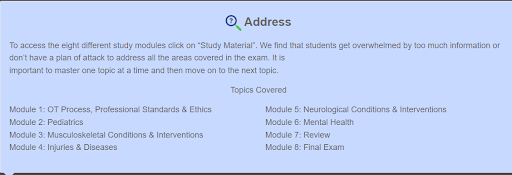
Introduction: Proprietary Study Tips and Exam Meditations.
Module One: OT Process, NBCOT® Rules and Regulations, Professional Development, OT Roles, Medicare vs. Medicaid, Professional Standards & Ethics, OT and OTA, Research & Statistics, Frame of Reference and Models.
Module Two: Pediatric Conditions and Interventions, Pediatric Development, Pediatric Reflexes, IEP.
Module Three: Musculoskeletal Conditions & Interventions, Physical agent modalities (PAM’S), Chronic Obstructive Pulmonary Disease (COPD), Chronic Heart Failure (CHF) and Met Levels, Functional Independence Measure (FIM).
Module Four: Spinal Cord Injury (SCI),Traumatic Brain Injury and Rancho Levels, Vision and Interventions, Prosthetics/Amputations, Hip and Knee Replacements, Burns, Aging in Place & other diseases.
Module Five: Neurological Conditions & Interventions, Wheelchair Mobility, Building Standards, Community Rehab, Vocational Rehab, Driver’s Rehab, Ergonomics, Adaptive Equipment and Assistive Technology.
Module Six: Psychosocial Conditions & Interventions, Groups and Group Dynamics, Allen’s Cognitive Level (ACL).
Module Seven: Review of Topics from Modules 1-6.
Module Eight: Final exams and exam prep including techniques to reduce exam anxiety. Here is how we recommend you should begin studying:
START by taking the 100 question Assessment Test to identify your strengths and weaknesses. If you have the time, take the 200 question Assessment Test so that you can get an accurate idea of which topics you need to focus more on when studying.
Days 2 - 4
NEXT: Go to module 7. This module contains “Quizzes by Category”. Start by taking the mini quizzes that correspond to the topics in which you scored the lowest on the Assessment Test and then systematically work your way through the quizzes from those in which you achieved the lowest scores to those in which you achieved the highest scores. If you score under 75% on any of the Module 7 quizzes, we suggest you go to the modules that contain the topics you need to master, so that you can review the relevant study material.
Review Modules 1 - 6: Try to review 1 module per day. Start with the module which you have identified as being the one you need to focus your attention on the most and work towards reviewing the modules from those you need to master to those in which you know you already have a sound knowledge. If you are really strong in any specific module, don’t spend too much time reviewing it so that you can rather spend more time reviewing the modules that you are weaker in. You want to try and become an expert on all the study material within each module. Read the worksheets, listen to the audio recordings, watch the videos, and focus on the highlighted information. You can cross reference information from other resources, but it is recommended that you follow your schedule, and you stay on the listed topics. This is also a good time to make flash cards of the information you have difficulty understanding. To help you understand a topic, come up with 2 or 3 examples of interventions for each diagnoses. As 50% of the exam is intervention based, we always want to keep that in mind. If you come across information you know, try not to study that information rather focus on what you don't know so that you can make your study time effective and efficient. Your time is very valuable. Once you review the material in a specific module and you feel that you have a strong grasp of the information, take the timed module exam. Do not waste time taking timed exams more than once. Instead, review only the questions you answered incorrectly and the topics you do not yet fully understand. This is a very important strategy you can use during this studying process. To further help you comprehend the information, try to figure out why one answer is correct, and the other answers are incorrect. Also come up with scenarios in which the wrong answers would be correct. If you score under 75% on a timed module exam, you should consider using private tutoring to review the answers that you got wrong as well as to discuss complex concepts that you are still confused about.
Day 12
Go to Module 8 and take our 200 question cumulative exam. We recommend that you score at least a 75% on this exam as this will give you a good gage if you are ready to take the NBCOT® exam. If you score under 75%, we highly recommend that you use private tutoring to help you go over those areas that you still need to master.
Day 13 - 14
Spend time reviewing all the questions you answered incorrectly on your cumulative exam so that you can understand the clinical reasoning behind the rationales which will ultimately help you master the topics. Use a private tutor to help you overcome any difficulties that you may be having. Having the support of a tutor will reduce your anxiety and boost your confidence so that you are ready to crush the exam! Also, listen to Stephanie’s pep talk in Module 8. Exercise, eat well, and make sure you get a great night's rest so that you are fully prepared to conquer the exam.
Below is a 4 week study plan, but as every student is unique, we can easily modify your individual study plan according to your needs, to adjust it to fit into your lifestyle. In order to get the most benefit from our program, we highly recommend combining our web course with a weekly or bi-weekly private tutoring session, until you take your exam. This will help prepare you enormously! Remember, this is just a proposal and we can easily modify your study plan to adjust to your lifestyle depending on whether you have kids, work obligations, or financial hardships. I suggest studying 2 modules per week until you take the exam. It is recommended that you study 4 - 7 hours per day and take at least a half day off. A breakdown of the modules are below:

Introduction: Proprietary Study Tips and Exam Meditations.
Module One: OT Process, NBCOT® Rules and Regulations, Professional Development, OT Roles, Medicare vs. Medicaid, Professional Standards & Ethics, OT and OTA, Research & Statistics, Frame of Reference and Models
Module Two:: Pediatric Conditions and Interventions, Pediatric Development, Pediatric Reflexes, and IEP.
Module Three: Musculoskeletal Conditions & Interventions, Physical agent modalities (PAM’S), Chronic Obstructive Pulmonary Disease (COPD), Chronic Heart Failure (CHF)/Met Levels, and Functional Independence Measure (FIM).
Module Four: Spinal Cord Injury (SCI),Traumatic brain injury and Rancho Levels, Vision Interventions, Prosthetics/Amputations, Hip and Knee Replacements, Burns, Aging in Place & other diseases.
Module Five: Neurological Conditions & Interventions, Wheelchair, Mobility, Building Standards, Community Rehab, Vocational Rehab, Driver’s Rehab, Ergonomics, Adaptive Equipment and Assistive Technology.
Module Six: Psychosocial Conditions & Interventions, Groups and Group Dynamics, Allen’s Cognitive Level (ACL), and Activities of Daily Living.
Module: Seven: Review of Topics from Modules 1-6.
Module Eight: Final exams and exam prep including techniques to reduce exam anxiety.
START by taking the Personality Assessment Test to determine what type of study style suits you best. You may be either a visual, auditory, or kinesthetic learner and it is incredibly helpful to understand the way you learn in order to maximize your studying efforts. It takes less than 5 minutes to complete this quiz.
NEXT: Take either the 200 question or 100 question Assessment Test to see what scores you get in all topics and domains. You do not need to take both exams. If you have the time, we highly recommend you take the timed 200 question test which gives you 4 hours to complete, just like in the actual exam. If you are pressed for time and want a quicker snapshot, take the 100 question test which gives you 2 hours to complete. This obviously will not give you as good a picture as the full 4 hour exam which will test your stamina better, but it will still give you a good idea on the areas you need to work on most.
LAST: After taking this Assessment Test , it is recommended that you review your results according to the category overview of the assessment. By using this approach, you will be able to see in which domains you scored the strongest and weakest. This will help guide you in setting up an optimal study plan, by helping you identify which topics you need to focus more on.
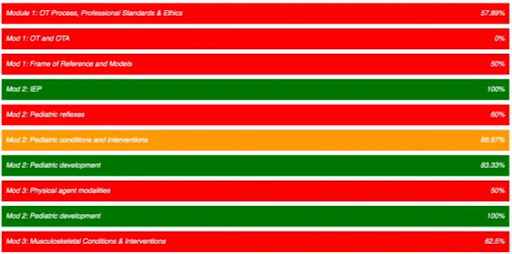
During the first three weeks, it is recommended you go through modules 1 - 6. Begin studying the module in which you scored the lowest and work backwards to the module in which you scored the highest. This approach will help you uncover your blind spots which will build your self confidence. During those first 3 weeks, it is recommended that you follow a schedule similar to the one below. I suggest covering 2 modules over a week which means you will be studying one module every three or four days for the next three weeks. To get the most from the learning material in each module, I suggest going through each of the 6 modules with the following system:
Day 1 (Assess) - Begin with your weakest module, based on your assessment test. It is best to begin each module with the module assessment quiz (untimed quiz) so that you know where to best focus your study efforts when reviewing the study material in that module. You do not need to study everything. Focus first on the areas where you scored the weakest. This will help prevent you from feeling overwhelmed, something which so many students complain about when using other study materials. Furthermore, we have highlighted the material for you so that we can help you focus on what is most important.
Days 1-2 (Address)

After taking the assessment quiz in that specific module and reviewing your strengths and weakness analysis, focus on studying the charts, listen to the audio recordings, watch the videos, and take note of the highlighted information! You can cross reference information from other resources, but it is recommended that you stay on the topics listed and you stay on schedule. This is also a good time to make flash cards of the information you are having difficulty understanding and to come up with 2 or 3 examples of interventions for each diagnoses. 50% of the exam is intervention based so we always want to keep that in mind. If you come across information you know, try not to study that information. Focus on what you don't know so that you can make sure you use your study time effectively and efficiently. Your time is very valuable and you do not want to fatigue yourself studying material you already know well.
Day 3 (Test)
At the end of each module, we offer timed and untimed tests to assess your knowledge. We also have tests with accommodations. You’ll also have the chance to review both correct and incorrect answers, with detailed rationales provided. We suggest aiming for a minimum score of 75% on each module quiz before moving on to the next module.

Day 4 (Assess)
Go to your second weakest module from your assessment test. - Begin with the module assessment quiz (untimed quiz) so that you know where to best focus your study efforts when reviewing the study material in that module. You do not need to study everything. Focus first on the areas where you were weakest. Remember, we have highlighted the material for you so that we can help you focus on what is most important.
Day 4 - 5 (Address)

After taking the assessment quiz in that module and reviewing your strengths and weakness analysis, focus on studying the charts, listen to the audio recordings, watch the videos, and take note of the highlighted information! You can cross reference information from other resources, but it is recommended that you stay on the topics listed and you stay on schedule. This is also a good time to make flash cards of difficult information and to come up with 2 or 3 examples of interventions for each diagnoses. 50% of the exam is intervention based so we always want to keep that in mind. If you come across information you know, try not to study that information. Focus on what you don't know so that you can use your study time effectively and efficiently. Your time is very valuable and you do not want to fatigue yourself studying material you already know well.
Day 6 (Test)
Take the timed quiz only on the topics which are covered in the module you are working through. You want to achieve a score of 75% or better. You should also be honest with yourself about the answers you correctly guessed. Guessing does not mean you understand the material . In fact, we recommend not guessing on our practice quizzes so that you get a true reflection of your abilities and where you stand. Review only the questions you got wrong and the topics you are confused about. This is the most important day of the week! Try to figure out why one answer is correct and the other answers are incorrect. Also come up with scenarios when the wrong answers would be correct.
Day 6 - 7 (Master)
Group Calls: To further master each module, we provide complimentary group tutoring sessions every week. All the calls are recorded and are posted to our group call archives under the group calls section so that if you listen it, you may also listen back to it. We also provide a library of former group calls that you may listen to whenever you like at no extra charge
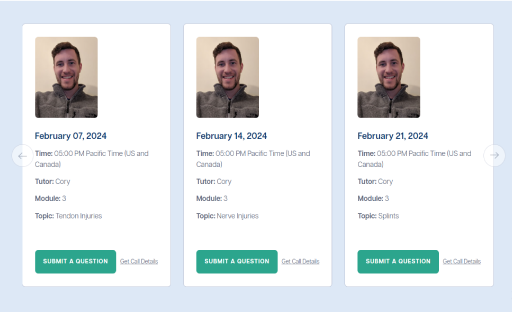
Private tutoring: To enhance mastery of each module, we offer private tutoring services. Private tutoring can assist in improving understanding of complex study material, enhancing critical thinking skills, learning strategies to deconstruct questions for identifying accurate answers, and managing test anxiety. Our students typically achieve a 3 to 6-point increase on the actual NBCOT® exam for every 1-hour tutoring session.
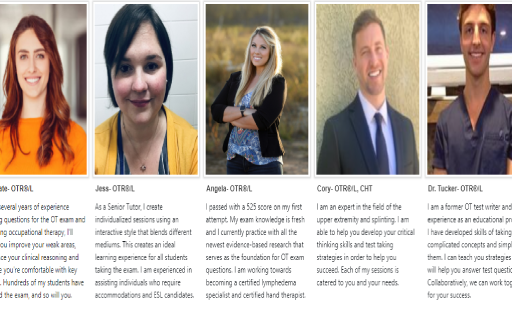
Ideally, you would work with a private tutor on day 6 or day 7 of each week to go through the 2 modules which you reviewed. The tutor will make sure that you know all the necessary information and that you are ready to proceed to the next module. Remember to make a document of any questions you would like to review or topics you'd like to go over. This will let the tutor know what to focus on and how to help you increase your critical thinking when it comes to breaking questions down, especially when two answer choices seem correct. We strongly suggest that you take advantage of private tutoring if you scored 75% or below on the timed exam for the given module. After your private tutoring session, you might want to take a break from studying. You should also take advantage of the free group tutoring sessions that we offer each week to all our active members. Attending these sessions will reinforce your understanding of complex material, increase your
critical thinking, give you a better understanding of interventions and teach you how to break down questions especially when two answer choices seem correct.
Day 8: You will continue to your third weakest module
Day 21 -24 - Go to module 7. Take the mini quizzes and brush up on any weak areas that you might still have.
Day 24 - 27 - Go to module 8. Review “Getting close to the exam” and use our meditations to relax and focus your mind. You should also take our timed 200 question cumulative exam. Review primarily the questions that you got wrong, and make sure that you understand the rationale and clinical applications behind the correct answers.
Day 24 - 27 - Use private tutoring to go through any other difficulties that you might be having and to boost your confidence and reduce your anxiety.
Day before test - Listen to Stephanie’s pep talk in module 8. Exercise, eat well, and make sure you get a great night's rest so that you are ready to crush the exam.
Below is a 8 week study plan, but as every student is unique, we can easily modify your individual study plan according to your needs, to adjust it to fit your lifestyle. In order to get the most benefit from our program, we highly recommend combining our web course with a weekly or bi-weekly private tutoring session, until you take your exam. This will help prepare you enormously! Remember, this is just a proposal and we can easily modify your study plan to adjust to your lifestyle depending on whether you have kids, work obligations, or financial hardships. I suggest studying 1 module per week until you take the exam.. It is recommended that you study 4 - 7 hours per day and take one day off. A breakdown of the material covered in the modules is below:

Introduction: Proprietary Study Tips and Exam Meditations.
Module One: OT Process, NBCOT® Rules and Regulations, Professional Development, Medicare vs. Medicaid, Professional Standards & Ethics, OT and OTA Roles, Research & Statistics, Frame of Reference and Models
Module Two: Pediatric Conditions and Interventions, Pediatric Development, Pediatric Reflexes, and IEP.
Module Three: Musculoskeletal Conditions & Interventions, Physical agent modalities (PAM’S), Chronic Obstructive Pulmonary Disease (COPD), Chronic Heart Failure (CHF)/Met Levels, and Functional Independence Measure (FIM).
Module Four: Spinal Cord Injury (SCI),Traumatic brain injury and Rancho Levels, Vision Interventions, Prosthetics/Amputations, Hip and Knee Replacements, Burns, Aging in Place & other diseases.
Module Five: Neurological Conditions & Interventions, Wheelchair, Mobility, Building Standards, Community Rehab, Vocational Rehab, Driver’s Rehab, Ergonomics, Adaptive Equipment and Assistive Technology.
Module Six: Psychosocial Conditions & Interventions, Groups and Group Dynamics, Allen’s Cognitive Level (ACL), and Activities of Daily Living.
Module Seven: Review of Topics from Modules 1-6.
Module Eight: Final exams and exam prep including techniques to reduce exam anxiety.
START by taking the Personality Assessment Test to determine what type of study style suits you best. You may be either a visual, auditory, or kinesthetic learner and it is incredibly helpful to understand the way you learn in order to maximize your studying efforts. It takes less than 5 minutes to complete this quiz.
NEXT: Take either the 200 question or 100 question assessment test to see what scores you get in all topics and domains. You should not take both exams. If you have the time, we highly recommend you take the timed 200 question test which gives you 4 hours to complete just like in the actual exam. If you are pressed for time and want a quicker snapshot, take the 100 question test which gives you 2 hours to complete. This obviously will not give you as good a picture as the full 4 hour exam which will test your stamina better, but it will still give you a good idea on the areas you need to work on most.
LAST: After taking this Assessment Test , it is recommended that you review your results according to the category overview of the assessment. By using this approach, you will be able to see in which domains you scored the strongest and weakest. This will help guide you in setting up an optimal study plan, by helping you identify which topics you need to focus more on.

During the first six weeks, you should go through modules 1 - 6. Begin studying the module in which you scored the lowest and work backwards to the module in which you scored the best. This approach will help you uncover your blind spots and build your confidence. During those first 3 weeks, it is recommended that you follow a schedule similar to the one below. I suggest spending 1 week on each module and therefore you will be studying the 6 modules over the next six weeks. To get the most from the learning material in each module, I suggest going through each of the 6 modules with the following system:
Day 1 (Assess)
It is best to begin each module with the module assessment quiz (untimed quiz) so that you know where to best focus your study efforts when reviewing the study material in that module. You do not need to study everything. Focus first on the areas where you were weakest. This will help you from feeling overwhelmed, something which so many students have complained about after using other study materials. Furthermore, we have highlighted the material for you so that we can help you focus on what is most important.
Days 1-3 (Address)
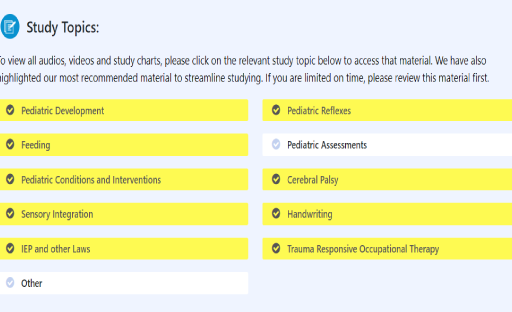
After taking the assessment quiz in that module and reviewing your strengths and weakness analysis, focus on studying the charts, listen to the audio recordings, watch the videos, and focus on the highlighted information! You can cross reference information from other resources, but it is recommended that you stay on the topics listed and you stay on schedule. This is also a good time to make flash cards of information you are having difficulty understanding and to come up with 2 or 3 examples of interventions for each diagnoses. 50% of the exam is intervention based so we always want to keep that in mind. If you come across information you know, try not to study that information. Focus on what you don't know so that you can make your study time effective and efficient. Your time is very valuable.
Here is an example of our upper extremities chart
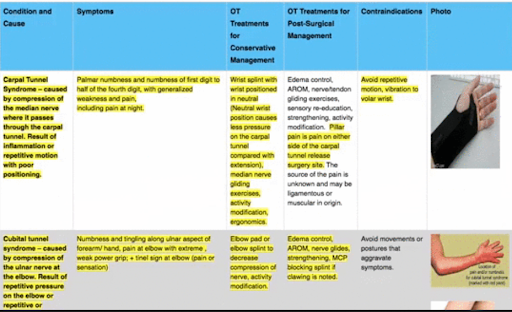
Here is an example of our pediatric handwriting chart
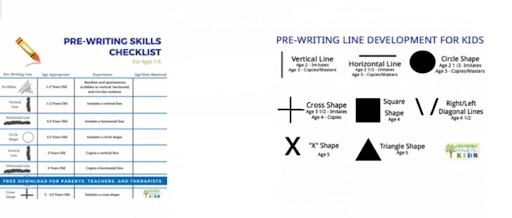
We have a quick sorting tool of our frames of reference chart to help you easily find what you are looking for.
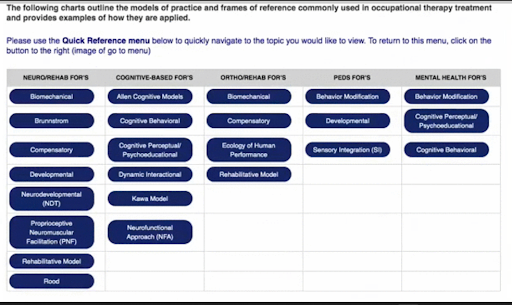
Podcasts and videos for on-the-go learning.
Our top tutors break down topics and questions, providing helpful tips, tricks, and easy-to-remember mnemonics.
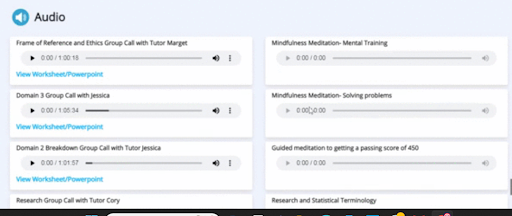
Day 4 (Test)
At the end of each module, we offer timed and untimed tests to assess your knowledge. We also have tests with accommodations. You’ll also have the chance to review both correct and incorrect answers, with detailed rationales provided. We suggest aiming for a minimum score of 75% on each module quiz before moving on to the next module.

Day 5 (Test)
Review only the questions you got wrong and the topics you are confused about. This is the most important day of the week! Try to figure out why one answer is correct and the other answers are incorrect. Also, come up with scenarios when the wrong answers would be correct.
Day 6 (Master)
Group Calls: To further master each module, we provide complimentary group tutoring sessions every week. All the calls are recorded and are posted to our group call archives under the group calls section so that if you listen it, you may also listen back to it. We also provide a library of former group calls that you may listen to whenever you like at no extra charge

Private tutoring: To enhance mastery of each module, we offer private tutoring services. Private tutoring can assist in improving understanding of complex study material, enhancing critical thinking skills, learning strategies to deconstruct questions for identifying accurate answers, and managing test anxiety. Our students typically achieve a 3 to 6-point increase on the actual NBCOT® exam for every 1-hour tutoring session.

Ideally, you would work with a private tutor on day six of each week to go through the module which you recently reviewed. If you have four tutoring sessions or less, you could use a tutor after covering every 2 modules. Your private tutor will make sure that you know all the necessary information and that you are ready to move on to the next module. Remember to make a document of any questions you would like to review or topics you'd like to go over. This will let the tutor know what to focus on and how to help you increase your critical thinking when it comes to breaking questions down, especially when two answer choices seem correct. We strongly suggest that you take advantage of our private tutoring if you scored 75% or below on the timed exam for the given module. We also highly recommend that you take advantage of the free group tutoring sessions that we offer each week to all our active members. Attending these sessions will reinforce your
understanding of complex material, increase your critical thinking, give you a better understanding of interventions and teach you how to break down questions especially when two answer choices seem correct
Day 7: Break
Day 8: You will start with your second weakest module, following the same procedure as the first module which you just completed. Does that make sense? Do you have any further questions?
Day 43 - In Module 7, you also get the option to take tests by topic or domain. We provide 34 different quizzes by categroy.
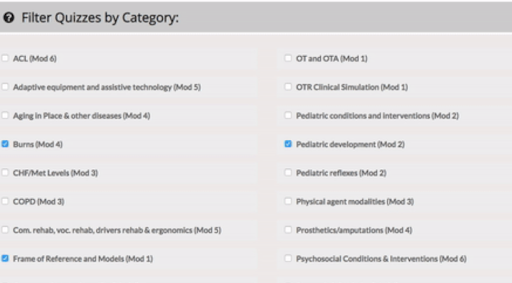
Day 50 - 55 Go to module 8. Review “Getting close to the exam” and use our meditations to relax and focus your mind. You should also take our timed 200 question cumulative exam. Review primarily the questions that you got wrong, and make sure that you understand the rationale and clinical applications behind the correct answers.
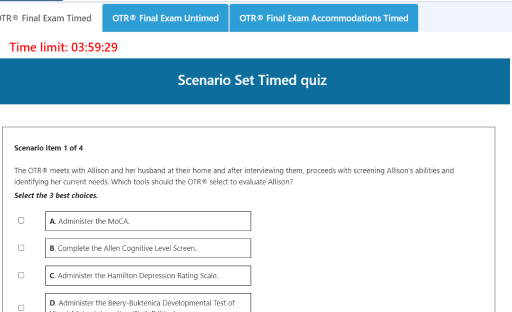
Day 50 - 57 - Use private tutoring to go through any other difficulties that you might be having and to boost your confidence and reduce your anxiety
Day before test: Listen to Stephanie’s pep talk in module 8. Exercise, eat well, and make sure you get a great night of rest so that you are ready to crush the exam.
Below is a 12 week study plan, but as every student is unique, we can easily modify your individual study plan according to your needs, to adjust it to fit your lifestyle. In order to get the most benefit from our program, we highly recommend combining our web course with a weekly or bi-weekly private tutoring session, until you take your exam. This will help prepare you enormously! Remember, this is just a proposal and we can easily modify your study plan to adjust to your lifestyle depending on whether you have kids, work obligations, or financial hardships. I suggest studying 1 module every 1.5 weeks until you take the exam.. It is recommended that you study 3-5 hours per day and take two day off. A breakdown of the material covered in the modules is below:

Introduction: Proprietary Study Tips and Exam Meditations.
Module One: OT Process, NBCOT® Rules and Regulations, Professional Development, Medicare vs. Medicaid, Professional Standards & Ethics, OT and OTA Roles, Research & Statistics, Frame of Reference and Models
Module Two: Pediatric Conditions and Interventions, Pediatric Development, Pediatric Reflexes, and IEP.
Module Three: Musculoskeletal Conditions & Interventions, Physical agent modalities (PAM’S), Chronic Obstructive Pulmonary Disease (COPD), Chronic Heart Failure (CHF)/Met Levels, and Functional Independence Measure (FIM).
Module Four: Spinal Cord Injury (SCI),Traumatic brain injury and Rancho Levels, Vision Interventions, Prosthetics/Amputations, Hip and Knee Replacements, Burns, Aging in Place & other diseases.
Module Five: Neurological Conditions & Interventions, Wheelchair, Mobility, Building Standards, Community Rehab, Vocational Rehab, Driver’s Rehab, Ergonomics, Adaptive Equipment and Assistive Technology.
Module Six: Psychosocial Conditions & Interventions, Groups and Group Dynamics, Allen’s Cognitive Level (ACL), and Activities of Daily Living.
Module Seven: Review of Topics from Modules 1-6.
Module Eight: Final exams and exam prep including techniques to reduce exam anxiety.
START by taking the Personality Assessment Test to determine what type of study style suits you best. You may be either a visual, auditory, or kinesthetic learner and it is incredibly helpful to understand the way you learn in order to maximize your studying efforts. It takes less than 5 minutes to complete this quiz.
NEXT: Take either the 200 question or 100 question assessment test to see what scores you get in all topics and domains. You should not take both exams. If you have the time, we highly recommend you take the timed 200 question test which gives you 4 hours to complete just like in the actual exam. If you are pressed for time and want a quicker snapshot, take the 100 question test which gives you 2 hours to complete. This obviously will not give you as good a picture as the full 4 hour exam which will test your stamina better, but it will still give you a good idea on the areas you need to work on most.
LAST: After taking this Assessment Test , it is recommended that you review your results according to the category overview of the assessment. By using this approach, you will be able to see in which domains you scored the strongest and weakest. This will help guide you in setting up an optimal study plan, by helping you identify which topics you need to focus more on.

During the first ten weeks, you should go through modules 1 - 6. Begin studying the module in which you scored the lowest and work backwards to the module in which you scored the best. This approach will help you uncover your blind spots and build your confidence. During those first 10 weeks, it is recommended that you follow a schedule similar to the one below. I suggest spending 1.5 weeks on each module and therefore you will be studying the 6 modules over the next six weeks. To get the most from the learning material in each module, I suggest going through each of the 6 modules with the following system:
Day 1 (Assess)
It is best to begin each module with the module assessment quiz (untimed quiz) so that you know where to best focus your study efforts when reviewing the study material in that module. You do not need to study everything. Focus first on the areas where you were weakest. This will help you from feeling overwhelmed, something which so many students have complained about after using other study materials. Furthermore, we have highlighted the material for you so that we can help you focus on what is most important.
Days 1-4 (Address)

After taking the assessment quiz in that module and reviewing your strengths and weakness analysis, focus on studying the charts, listen to the audio recordings, watch the videos, and focus on the highlighted information! You can cross reference information from other resources, but it is recommended that you stay on the topics listed and you stay on schedule. This is also a good time to make flash cards of information you are having difficulty understanding and to come up with 2 or 3 examples of interventions for each diagnoses. 50% of the exam is intervention based so we always want to keep that in mind. If you come across information you know, try not to study that information. Focus on what you don't know so that you can make your study time effective and efficient. Your time is very valuable.
Day 5 (Test)
Take the timed quiz only on the topics which are covered in the module you are working through.You want to achieve a score of 75% or better. You should also be honest with yourself on answers where you correctly guessed the right answer. Guessing does not mean you understand the material In fact, we recommend not guessing on our practice quizzes so that you will get a true reflection of your abilities and understand where you stand
Day 6-7: Break
Day 8-10 (Master)
Ideally, you would work with a private tutor on day six of each week to go through the module which you recently reviewed. If you have four tutoring sessions or less, you could use a tutor after covering every 2 modules. Your private tutor will make sure that you know all the necessary information and that you are ready to move on to the next module. Remember to make a document of any questions you would like to review or topics you'd like to go over. This will let the tutor know what to focus on and how to help you increase your critical thinking when it comes to breaking questions down, especially when two answer choices seem correct. We strongly suggest that you take advantage of our private tutoring if you scored 75% or below on the timed exam for the given module. We also highly recommend that you take advantage of the free group tutoring sessions that we offer each week to all our active members. Attending these sessions will reinforce your
understanding of complex material, increase your critical thinking, give you a better understanding of interventions and teach you how to break down questions especially when two answer choices seem correct
Day 11: You will start with your second weakest module, following the same procedure as the first module which you just completed.
Day 70 - Go to module 7 to take the mini quizzes and brush up on any weak areas that you might still have.
Day 78-81 Go to module 8. Review “Getting close to the exam” and use our meditations to relax and focus your mind. You should also take our timed 200 question cumulative exam. Review primarily the questions that you got wrong, and make sure that you understand the rationale and clinical applications behind the correct answers.
Day 77 - 84 - Use private tutoring to go through any other difficulties that you might be having and to boost your confidence and reduce your anxiety
Day before test: Listen to Stephanie’s pep talk in module 8. Exercise, eat well, and make sure you get a great night of rest so that you are ready to crush the exam.
Below is a 16 week study plan, but as every student is unique, we can easily modify your individual study plan according to your needs, to adjust it to fit your lifestyle. In order to get the most benefit from our program, we highly recommend combining our web course with a private tutoring session every 2 weeks or more until you take your exam. This will help prepare you enormously! Remember, this is just a proposal and we can easily modify your study plan to adjust to your lifestyle depending on whether you have kids, work obligations, or financial hardships. I suggest studying 1 module per week until you take the exam.. It is recommended that you study 3 - 5 hours per day and take one day off. A breakdown of the material covered in the modules are below:

Introduction: Proprietary Study Tips and Exam Meditations.
Module One: OT Process, NBCOT® Rules and Regulations, Professional Development, OT Roles, Medicare vs. Medicaid, Professional Standards & Ethics, OT and OTA, Research & Statistics, Frame of Reference and Models
Module Two: Pediatric Conditions and Interventions, Pediatric Development, Pediatric Reflexes, and IEP.
Module Three: Musculoskeletal Conditions & Interventions, Physical agent modalities (PAM’S), Chronic Obstructive Pulmonary Disease (COPD), Chronic Heart Failure (CHF)/Met Levels, and Functional Independence Measure (FIM).
Module Four: Spinal Cord Injury (SCI),Traumatic brain injury and Rancho Levels, Vision Interventions, Prosthetics/Amputations, Hip and Knee Replacements, Burns, Aging in Place & other diseases.
Module Five: Neurological Conditions & Interventions, Wheelchair, Mobility, Building Standards, Community Rehab, Vocational Rehab, Driver’s Rehab, Ergonomics, Adaptive Equipment and Assistive Technology.
Module Six: Psychosocial Conditions & Interventions, Groups and Group Dynamics, Allen’s Cognitive Level (ACL), and Activities of Daily Living.
Module Seven: Review of Topics in Modules 1-6
Module Eight: Final exams and exam prep including techniques to reduce exam anxiety.
START by taking the Personality Assessment Test to determine what type of study style suits you best. You may be either a visual, auditory, or kinesthetic learner and it is incredibly helpful to understand the way you learn in order to maximize your studying efforts. It takes less than 5 minutes to complete this quiz.
NEXT: Take either the 200 question or 100 question assessment test to see what scores you get in all topics and domains. You should not take both exams. If you have the time, we highly recommend you take the timed 200 question test which gives you 4 hours to complete just like in the actual exam. If you are pressed for time and want a quicker snapshot, take the 100 question test which gives you 2 hours to complete. This obviously will not give you as good a picture as the full 4 hour exam which will test your stamina better, but it will still give you a good idea on the areas you need to work on most.
LAST: After taking this Assessment Test , it is recommended that you review your results according to the category overview of the assessment. By using this approach, you will be able to see in which domains you scored the strongest and weakest. This will help guide you in setting up an optimal study plan, by helping you identify which topics you need to focus more on.

During the first six weeks, you should go through modules 1 - 6. Begin studying the module in which you scored the lowest and work backwards to the module in which you scored the best. This approach will help you uncover your blind spots and build your confidence. During those first 12 weeks, it is recommended that you follow a schedule similar to the one below. I suggest spending 2 weeks on each module and therefore you will be studying the 6 modules over the next twelve weeks. To get the most from the learning material in each module, I suggest going through each of the 6 modules with the following system:
Day 1 (Assess)
It is best to begin each module with the module assessment quiz (untimed quiz) so that you know where to best focus your study efforts when reviewing the study material in that module. You do not need to study everything. Focus first on the areas where you were weakest. This will help you from feeling overwhelmed, something which so many students have complained about after using other study materials. Furthermore, we have highlighted the material for you so that we can help you focus on what is most important.
Days 1-6 (Address)

After taking the assessment quiz in that module and reviewing your strengths and weakness analysis, focus on studying the charts, listen to the audio recordings, watch the videos, and focus on the highlighted information! You can cross reference information from other resources, but it is recommended that you stay on the topics listed and you stay on schedule. This is also a good time to make flash cards of information you are having difficulty understanding and to come up with 2 or 3 examples of interventions for each diagnoses. 50% of the exam is intervention based so we always want to keep that in mind. If you come across information you know, try not to study that information. Focus on what you don't know so that you can make your study time effective and efficient. Your time is very valuable.
Day 7 - Break
Days 8 -11 (Test)
Take the timed quiz only on the topics which are covered in the module you are working through. You want to achieve a score of 75% or better. You should also be honest with yourself on answers where you correctly guessed the right answer. Guessing does not mean you understand the material In fact, we recommend not guessing on our practice quizzes so that you will get a true reflection of your abilities and understand where you stand
Day 11 -12 (Test) . Review only the questions you got wrong and the topics you are confused about. This is the most important day of the week! Try to figure out why one answer is correct and the other answers are incorrect. Also, come up with scenarios when the wrong answers would be correct.
Day 12- 13 (Master). Ideally, you would work with a private tutor on days 12 - 14 of each week to go through the module which you recently reviewed. If you have four tutoring sessions or less, you could use a tutor after covering every 2 modules. Your private tutor will make sure that you know all the necessary information and that you are ready to move on to the next module. Remember to make a document of any questions you would like to review or topics you'd like to go over. This will let the tutor know what to focus on and how to help you increase your critical thinking when it comes to breaking questions down, especially when two answer choices seem correct. We strongly suggest that you take advantage of our private tutoring if you scored 75% or below on the timed exam for the given module. We also highly recommend that you take advantage of the free group tutoring sessions that we offer each week to all our active members. Attending these
sessions will reinforce your understanding of complex material, increase your critical thinking, give you a better understanding of interventions and teach you how to break down questions especially when two answer choices seem correct
Day 14: Break
Day 15: You will start with your second weakest module module, following the same procedure as the first module which you just completed. Does that make sense? Do you have any further questions?
Day 85 - Go to module 7 to take the mini quizzes and brush up on any weak areas that you might still have.
Day 50 - 55 Go to module 8. Review “Getting close to the exam” and use our meditations to relax and focus your mind. You should also take our timed 200 question cumulative exam. Review primarily the questions that you got wrong, and make sure that you understand the rationale and clinical applications behind the correct answers.

Day 50 - 57 - Use private tutoring to go through any other difficulties that you might be having and to boost your confidence and reduce your anxiety
Day before test: Listen to Stephanie’s pep talk in module 8. Exercise, eat well, and make sure you get a great night of rest so that you are ready to crush the exam.
START by taking the Personality Assessment Test to determine what type of study style suits you best. You may be either a visual, auditory, or kinesthetic learner and it is incredibly helpful to understand the way you learn in order to maximize your studying efforts. It takes less than 5 minutes to complete this quiz.
NEXT: Take either the 200 question or 100 question assessment test to see what scores you get in all topics and domains. You should not take both exams. If you have the time, we highly recommend you take the timed 200 question test which gives you 4 hours to complete just like in the actual exam. If you are pressed for time and want a quicker snapshot, take the 100 question test which gives you 2 hours to complete. This obviously will not give you as good a picture as the full 4 hour exam which will test your stamina better, but it will still give you a good idea on the areas you need to work on most.
LAST: After taking this Assessment Test , it is recommended that you review your results according to the category overview of the assessment. By using this approach, you will be able to see in which domains you scored the strongest and weakest. This will help guide you in setting up an optimal study plan, by helping you identify which topics you need to focus more on.

During the first 18 weeks, you should go through modules 1 - 6. Begin studying the module in which you scored the lowest and work backwards to the module in which you scored the best. This approach will help you uncover your blind spots and build your confidence. Your program director may also have you work through the modules sequentially. If they have you do this, please follow their system During those first 3 weeks, it is recommended that you follow a schedule similar to the one below. I suggest spending 3 weeks on each module and therefore you will be studying the 6 modules over the next 18 weeks. A breakdown of the modules are below:

Introduction: Proprietary Study Tips and Exam Meditations.
Module One (Weeks 1 - 3 ): OT Process, NBCOT® Rules and Regulations, Professional Development, OT Roles, Medicare vs. Medicaid, Professional Standards & Ethics, OT and OTA, Research & Statistics, Frame of Reference and Models (Weeks 1 -3)
Module Two (Weeks 4 -6): Pediatric Conditions and Interventions, Pediatric Development, Pediatric Reflexes, and IEP. Weeks (4 - 6)
Module Three (Weeks 7 - 9): Musculoskeletal Conditions & Interventions, Physical agent modalities (PAM’S), Chronic Obstructive Pulmonary Disease (COPD), Chronic Heart Failure (CHF)/Met Levels, and Functional Independence Measure (FIM).
Module Four (Weeks 9 - 12): Spinal Cord Injury (SCI),Traumatic brain injury and Rancho Levels, Vision Interventions, Prosthetics/Amputations, Hip and Knee Replacements, Burns, Aging in Place & other diseases.
Module Five (Weeks 12 - 15): Neurological Conditions & Interventions, Wheelchair, Mobility, Building Standards, Community Rehab, Vocational Rehab, Driver’s Rehab, Ergonomics, Adaptive Equipment and Assistive Technology.
Module Six (Weeks 15 - 18): Psychosocial Conditions & Interventions, Groups and Group Dynamics, Allen’s Cognitive Level (ACL), and Activities of Daily Living.
Module Seven (Weeks 18 - 21): Review of Topics from Modules 1-6.
Module Eight (Weeks 21 - 24): Final timed exams and exam prep including techniques to reduce exam anxiety. To get the most from the learning material in each module, I suggest going through each of the 6 modules with the following system:
START by taking the Personality Assessment Test to determine what type of study style suits you best. You may be either a visual, auditory, or kinesthetic learner and it is incredibly helpful to understand the way you learn in order to maximize your studying efforts. It takes less than 5 minutes to complete this quiz.
NEXT: Take either the 200 question or 100 question assessment test to see what scores you get in all topics and domains. You should not take both exams. If you have the time, we highly recommend you take the timed 200 question test which gives you 4 hours to complete just like in the actual exam. If you are pressed for time and want a quicker snapshot, take the 100 question test which gives you 2 hours to complete. This obviously will not give you as good a picture as the full 4 hour exam which will test your stamina better, but it will still give you a good idea on the areas you need to work on most.
LAST: After taking this Assessment Test , it is recommended that you review your results according to the category overview of the assessment. By using this approach, you will be able to see in which domains you scored the strongest and weakest. This will help guide you in setting up an optimal study plan, by helping you identify which topics you need to focus more on.

Week 1(Assess)
It is best to begin each module with the module assessment quiz (untimed quiz) so that you know where to best focus your study efforts when reviewing the study material in that module. You do not need to study everything. Focus first on the areas where you were weakest. This will help you from feeling overwhelmed, something which so many students have complained about after using other study materials. Furthermore, we have highlighted the material for you so that we can help you focus on what is most important.
Week 2 (Address)
After taking the assessment quiz in that module and reviewing your strengths and weakness analysis, focus on studying the charts, listen to the audio recordings, watch the videos, and focus on the highlighted information! You can cross reference information from other resources, but it is recommended that you stay on the topics listed and you stay on schedule. This is also a good time to make flash cards of information you are having difficulty understanding and to come up with 2 or 3 examples of interventions for each diagnoses. 50% of the exam is intervention based so we always want to keep that in mind. If you come across information you know, try not to study that information. Focus on what you don't know so that you can make your study time effective and efficient. Your time is very valuable.
Week 3 (Test)
Take the timed quiz only on the topics which are covered in the module you are working through. You want to achieve a score of 75% or better. You should also be honest with yourself on answers where you correctly guessed the right answer. Guessing does not mean you understand the material In fact, we recommend not guessing on our practice quizzes so that you will get a true reflection of your abilities and understand where you stand
Week 3 (Test) . Review only the questions you got wrong and the topics you are confused about. This is the most important day of the week! Try to figure out why one answer is correct and the other answers are incorrect. Also, come up with scenarios when the wrong answers would be correct.
Week 3 (Master) We highly recommend that you take advantage of the free group tutoring sessions that we offer each week to all our active members. Attending these sessions will reinforce your understanding of complex material, increase your critical thinking, give you a better understanding of interventions and teach you how to break down questions especially when two answer choices seem correct Ideally, you would with a private tutor on any module where you scored 75% or below on its timed exam. Your private tutor will make sure that you know all the necessary information and that you are ready to move on to the next module. Remember to make a document of any questions you would like to review or topics you'd like to go over. This will let the tutor know what to focus on and how to help you increase your critical thinking when it comes to breaking questions down, especially when two answer choices seem correct. We strongly suggest that you take
advantage of our private tutoring if you scored 75% or below on the timed exam for the given module.
Week 4: Students shall follow this same schedule for the next 7 modules until they take the exam.
Review- Go to module 7 to take the mini quizzes and brush up on any weak areas that you might still have.
Finals - Go to module 8. Review “Getting close to the exam” and use our meditations to relax and focus your mind. You should also take our timed 200 question cumulative exam. Review primarily the questions that you got wrong, and make sure that you understand the rationale and clinical applications behind the correct answers.
Day 50 - 57 - Use private tutoring to go through any other difficulties that you might be having and to boost your confidence and reduce your anxiety
Day before test: Listen to Stephanie’s pep talk in module 8. Exercise, eat well, and make sure you get a great night of rest so that you are ready to crush the exam. 2 Weeks or less Plan

During the first three weeks, it is recommended you go through modules 1 - 6. Begin studying the module in which you scored the lowest and work backwards to the module in which you scored the highest. This approach will help you uncover your blind spots which will build your self confidence. During those first 3 weeks, it is recommended that you follow a schedule similar to the one below. I suggest covering 2 modules over a week which means you will be studying one module every three or four days for the next three weeks. To get the most from the learning material in each module, I suggest going through each of the 6 modules with the following system:
Day 1 (Assess) - Begin with your weakest module, based on your assessment test. It is best to begin each module with the module assessment quiz (untimed quiz) so that you know where to best focus your study efforts when reviewing the study material in that module. You do not need to study everything. Focus first on the areas where you scored the weakest. This will help prevent you from feeling overwhelmed, something which so many students complain about when using other study materials. Furthermore, we have highlighted the material for you so that we can help you focus on what is most important.
Days 1-2 (Address)

After taking the assessment quiz in that specific module and reviewing your strengths and weakness analysis, focus on studying the charts, listen to the audio recordings, watch the videos, and take note of the highlighted information! You can cross reference information from other resources, but it is recommended that you stay on the topics listed and you stay on schedule. This is also a good time to make flash cards of the information you are having difficulty understanding and to come up with 2 or 3 examples of interventions for each diagnoses. 50% of the exam is intervention based so we always want to keep that in mind. If you come across information you know, try not to study that information. Focus on what you don't know so that you can make sure you use your study time effectively and efficiently. Your time is very valuable and you do not want to fatigue yourself studying material you already know well.
Day 3 (Test)
At the end of each module, we offer timed and untimed tests to assess your knowledge. We also have tests with accommodations. You’ll also have the chance to review both correct and incorrect answers, with detailed rationales provided. We suggest aiming for a minimum score of 75% on each module quiz before moving on to the next module.

Day 4:(Assess)
Go to your second weakest module from your assessment test. - Begin with the module assessment quiz (untimed quiz) so that you know where to best focus your study efforts when reviewing the study material in that module. You do not need to study everything. Focus first on the areas where you were weakest. Remember, we have highlighted the material for you so that we can help you focus on what is most important.
Day 4 - 5 (Address)
 After taking the assessment quiz in that module and reviewing your
strengths and weakness analysis, focus on studying the charts, listen to the audio recordings,
watch the videos, and take note of the highlighted information! You can cross reference
information from other resources, but it is recommended that you stay on the topics listed and you
stay on schedule. This is also a good time to make flash cards of difficult information and to
come up with 2 or 3 examples of interventions for each diagnoses. 50% of the exam is intervention
based so we always want to keep that in mind. If you come across information you know, try not to
study that information. Focus on what you don't know so that you can use your study time
effectively and efficiently. Your time is very valuable and you do not want to fatigue yourself
studying material you already know well.
After taking the assessment quiz in that module and reviewing your
strengths and weakness analysis, focus on studying the charts, listen to the audio recordings,
watch the videos, and take note of the highlighted information! You can cross reference
information from other resources, but it is recommended that you stay on the topics listed and you
stay on schedule. This is also a good time to make flash cards of difficult information and to
come up with 2 or 3 examples of interventions for each diagnoses. 50% of the exam is intervention
based so we always want to keep that in mind. If you come across information you know, try not to
study that information. Focus on what you don't know so that you can use your study time
effectively and efficiently. Your time is very valuable and you do not want to fatigue yourself
studying material you already know well.
Day 6 (Test)
Take the timed quiz only on the topics which are covered in the module you are working through. You want to achieve a score of 75% or better. You should also be honest with yourself about the answers you correctly guessed. Guessing does not mean you understand the material . In fact, we recommend not guessing on our practice quizzes so that you get a true reflection of your abilities and where you stand. Review only the questions you got wrong and the topics you are confused about. This is the most important day of the week! Try to figure out why one answer is correct and the other answers are incorrect. Also come up with scenarios when the wrong answers would be correct.
Day 6 - 7 (Master)
Group Calls: To further master each module, we provide complimentary group tutoring sessions every week. All the calls are recorded and are posted to our group call archives under the group calls section so that if you listen it, you may also listen back to it. We also provide a library of former group calls that you may listen to whenever you like at no extra charge

Private tutoring: To enhance mastery of each module, we offer private tutoring services. Private tutoring can assist in improving understanding of complex study material, enhancing critical thinking skills, learning strategies to deconstruct questions for identifying accurate answers, and managing test anxiety. Our students typically achieve a 3 to 6-point increase on the actual NBCOT® exam for every 1-hour tutoring session.

Ideally, you would work with a private tutor on day 6 or day 7 of each week to go through the 2 modules which you reviewed. The tutor will make sure that you know all the necessary information and that you are ready to proceed to the next module. Remember to make a document of any questions you would like to review or topics you'd like to go over. This will let the tutor know what to focus on and how to help you increase your critical thinking when it comes to breaking questions down, especially when two answer choices seem correct. We strongly suggest that you take advantage of private tutoring if you scored 75% or below on the timed exam for the given module. After your private tutoring session, you might want to take a break from studying. You should also take advantage of the free group tutoring sessions that we offer each week to all our active members. Attending these sessions will reinforce your understanding of complex material, increase your
critical thinking, give you a better understanding of interventions and teach you how to break down questions especially when two answer choices seem correct.
Day 8: You will continue to your third weakest module.
Day 21 -24 - Go to module 7. Take the mini quizzes and brush up on any weak areas that you might still have.
Day 24 - 27: - Go to module 8. Review “Getting close to the exam” and use our meditations to relax and focus your mind. You should also take our timed 200 question cumulative exam. Review primarily the questions that you got wrong, and make sure that you understand the rationale and clinical applications behind the correct answers.
Day 24 - 27 - Use private tutoring to go through any other difficulties that you might be having and to boost your confidence and reduce your anxiety.
Day before test - Listen to Stephanie’s pep talk in module 8. Exercise, eat well, and make sure you get a great night's rest so that you are ready to crush the exam.
Course Outline
Comparison with other Prep Courses
Pass the OT compared to other study prep for the NBCOT® Exam.
 Therapy ED
AOTA® Online
True Learn
NBCOT® Study Pack
OT Help Desk
Therapy ED
AOTA® Online
True Learn
NBCOT® Study Pack
OT Help Desk
Customer Reviews
Based on 353 Reviews
Tutor Kate is Amazing!!!!
I failed the NBCOT multiple times and was so close to giving up but so thankful I didn't. I am so grateful I gave pass the OT a chance, the program provided through this course made me feel the most prepared out of all the other resources I used. I worked with Tutor Kate for 6 sessions and have nothing but good things to say. Kate helped enhance my critical reasoning, break down questions and shaped the way I think when it came to NBCOT questions. Kate always had an explanation even when an explanation did not seem possible at some times. She is patient, has an abundance of knowledge, and you can tell she cares to see her students succeed. I highly recommend studying with Kate!
TiaBest NBCOT Prep Course Available!
I passed the NBCOT exam on the first try with a 532 and am now a COTA. I could not have achieved such a great score without the guidance and support from PASS THE OT. The modules are easy to follow and break down the information in such a way that studying/retaining information becomes second nature. Live tutoring sessions and videos really helped with harder content. I cannot say enough great things about this program. You will not regret picking this resource as your main study tool for NBCOT prep!
Dana P.Helped me pass on my 3rd attempt!
Prior to me utilizing the PassTHEOT service I was defeated, and after failing my second attempt by just 9 points I was convinced I would never become an occupational therapist. My tutor Jessica gave me the confidence I needed to approach the exam one last time, and provided me with questions that were geared to help me think, challenged my perspective of the exam, as well as providing me with questions on topics I found challenging. I found that Jessica went above and beyond to not only be a tutor but a healthy support system. My tutor Angela was so dedicated that she allowed me to book a session the morning of Thanksgiving, and she utilized her knowledge in splints and CHT to assist me in understanding the body better, providing me with homework to get my noggin joggin, as well as fun tips to recall scientific reasoning! I found Angela to be hilarious and dedicated with a unique approach to making learning fun again! If you are thinking about giving up, please dont! Angela and Jessica are dedicated practitioners who want to assist everyone in becoming successful and competent occupational therapists of the future.
Tiara R.Helped me pass on my 3rd attempt!
Prior to me utilizing the PassTHEOT service I was defeated, and after failing my second attempt by just 9 points I was convinced I would never become an occupational therapist. My tutor Jessica gave me the confidence I needed to approach the exam one last time, and provided me with questions that were geared to help me think, challenged my perspective of the exam, as well as providing me with questions on topics I found challenging. I found that Jessica went above and beyond to not only be a tutor but a healthy support system. My tutor Angela was so dedicated that she allowed me to book a session the morning of Thanksgiving, and she utilized her knowledge in splints and CHT to assist me in understanding the body better, providing me with homework to get my noggin joggin, as well as fun tips to recall scientific reasoning! I found Angela to be hilarious and dedicated with a unique approach to making learning fun again! If you are thinking about giving up, please dont! Angela and Jessica are dedicated practitioners who want to assist everyone in becoming successful and competent occupational therapists of the future.
Tiara S.BEST study program!!!
I absolutely loved my Pass the OT experience. The program is designed for success! I got a 517 on my first NBCOT attempt and I couldn't have done it without Pass the OT!!!
Morgan C.Passtheot gave me the tools to help me pass my exam on the first try.
Passtheot was the only study tool I used and it helped my pass my exam. I appreciate this program.
Jessica